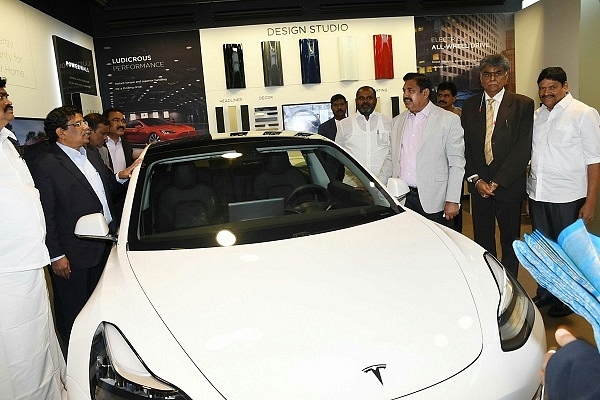News Brief
India’s Automobile Powerhouse Tamil Nadu Unveils Electric Vehicle Policy, Aims For Rs 50,000 Crore Investment, 1.5 Lakh Jobs
- Tamil Nadu, currently a major automotive manufacturing powerhouse, aims to build a comprehensive EV ecosystem for which it hopes to attract a cumulative investment of Rs 50,000 crore

Tamil Nadu Chief Minister Edappadi K Palaniswami at Tesla’s California factory
Tamil Nadu Chief Minister Edappadi K Palaniswami today (16 September) unveiled an ambitious Electric Vehicle Policy that seeks to catapult the state as the hub of electric vehicles (EVs) and component manufacturing units including battery and charging infrastructure.
Through this policy, Tamil Nadu, currently a major automotive manufacturing powerhouse, aims to build a comprehensive EV ecosystem for which it hopes to attract a cumulative investment of Rs 50,000 crore. Around 150,000 new jobs are expected to be created in the new ecosystem.
Under the policy, besides waiver on registration charges/fees (as per Government of India's notification), the state government will introduce 100 per cent motor vehicle tax exemption for all electric vehicles including two wheelers, cars, auto rickshaws, buses and light goods carriers – till 31 December 2022.
There will be no permit requirement for the three-wheeler goods, e-carriers as well as electric light goods carriers.
The state plans to create a robust infrastructure for electric vehicles including adequate power supply and network of charging points with favourable power tariff. TANGEDCO (Tamil Nadu Generation and Distribution Corporation) will set up charging infrastructure on its own or through public private partnership models.
The state envisages setting up one charging station every 25 km on both sides of NHAI and State Highways.
The State government will offer incubation services in the form of office space, common facilities and mentoring support to encourage start-ups in the EV sector.
Under this policy, support will also be provided for existing automobile manufacturers to adapt to the EV manufacturing system including a one-time re-skilling allowance for the existing production line employees.
The policy seeks to create a pool of skilled workforce for the EV industry through the technical institutions available in the state and create new jobs.
Such an initiative by Tamil Nadu is in line with the Centre’s extensive push for EV adoption. In her finance budget speech Finance Minister Nirmala Sitharaman had unveiled benefits for EV buyers and announced favourable regulatory environment for the industry.
Sitharaman had announced a rebate of up to Rs 1.5 lakh for the buyers on interest paid on loans to purchase the vehicles, with benefit of up to Rs 2.5 lakh over the entire loan period. To lower the cost of manufacturing for the industry, she announced customs duty exemption on lithium–ion cells.
The government has also implemented the FAME-II scheme via which it seeks to incentivise the adoption of electric buses, three and four-wheelers, and those with sizeable lithium-ion battery.
The central government is also planning to build six lithium-ion Gigafactories which would be used to power India’s rising EV ecosystem.
It remains to be seen if Tamil Nadu becomes a likely spot for the proposed Gigafactories after the announcement of its own decision to promote EV component manufacturing units.
Support Swarajya's 50 Ground Reports Project & Sponsor A Story
Every general election Swarajya does a 50 ground reports project.
Aimed only at serious readers and those who appreciate the nuances of political undercurrents, the project provides a sense of India's electoral landscape. As you know, these reports are produced after considerable investment of travel, time and effort on the ground.
This time too we've kicked off the project in style and have covered over 30 constituencies already. If you're someone who appreciates such work and have enjoyed our coverage please consider sponsoring a ground report for just Rs 2999 to Rs 19,999 - it goes a long way in helping us produce more quality reportage.
You can also back this project by becoming a subscriber for as little as Rs 999 - so do click on this links and choose a plan that suits you and back us.
Click below to contribute.
Latest